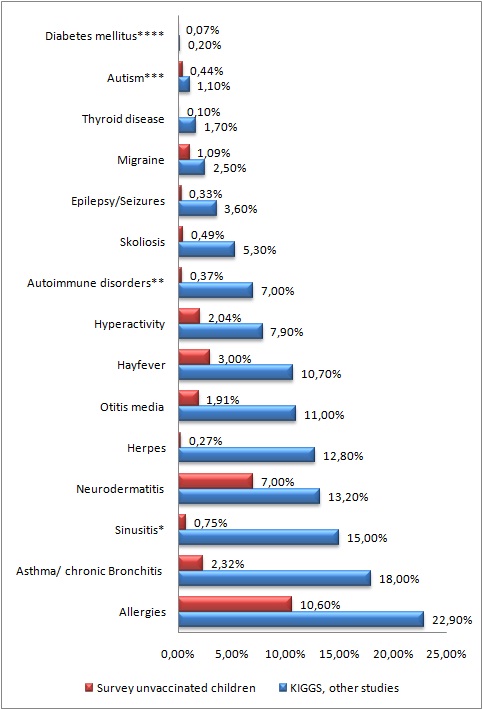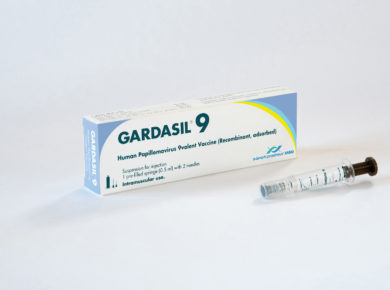In my last post, I demonstrated that unvaccinated kids were healthier.
Another study that is being done in Germany further supports this fact.
Due to the fact that the majority of children in the survey are between 0 and 2 years of age and some diseases generally do not appear in this age group, the results are subdivided into different age groups.
Asthma, hay fever and neurodermatitis are seen very frequently today.
A recent German study with 17461 children between 0-17 years of age showed that 4.7% of these children suffer from asthma, 10.7% of these children from hay fever and 13.2% from neurodermatitis.
These numbers differ in western countries, i.e. the prevalence of asthma among children in the US is 6% whereas it is 14-16% in Australia.
The prevalence of asthma among unvaccinated children in our study is around 2.5%, hay fever 3% and neurodermatitis 7%.
According to the KIGGS study more than 40% of children between the ages of 3 and 17 years were sensitized against at least one allergen tested (20 common allergens were tested) and 22.9% had an allergic disease.
ADS and Hyperactivity is between 1 and 2 % in our survey, the prevalence of ADHD in Germany is 7,9% and another 5,9% which were not yet diagnosed, but were borderline cases.
There are also autism cases in unvaccinated children. Among all participants there were 4 severe autism cases.
Of these 4 children one tested very high for metals (mercury, aluminum, arsenic), in another case the mother was tested very high for mercury.
The CDC estimates that about 1 in 40 (2.5%) children has been identified with an autism spectrum disorder (ASD).
ASDs are almost 5 times more common among boys (1 in 54; 1,8%) than among girls(1 in 252;0,39%).(Jon Baio, Prevalence of Autism Spectrum Disorders — Autism and Developmental Disabilities Monitoring Network, 14 Sites, United States, 2008, March 30, 2012 / 61(SS03);1-19)
KIGGS showed that 12.8% of the children in Germany had herpes and 11% suffer from otitis media (an inflammation of the middle ear). If you compare this to unvaccinated childen you can see that herpes among unvaccinated children is very rare (less than 0.5%).
The prevalence of sinusitis in young children has gone up as high as 32%.
(Albegger KW. Banale Entzüngen der Nase und der Nasennebenhöhlen. In: Berendes J, Link JR, Zöllner F, eds. Hals, Nasen-OhrenHeilkunde in Praxis und Klinik. Band I. Obere und untere Luftwege. Stuttgart: G Thieme Verlag, 1979: 11.1–11.32.)
In our survey less than 1% of the children have problems with sinusitis, in
around 2% it happened only once or rarely.
In young kids under the age of 3 warts are very rare. Above the age of three years however the prevalence is rising. In the ages between 4 and 6 years, 5-10% of the kids have warts, in the age group 16-18, 15-20% have warts. Only 3% of unvaccinated children in our survey have warts.
The national institute of health in the USA states that 23.5 % Americans suffer from autoimmune disease. This is a prevalence of more than 7% of children.
Diabetes affects 0.2% of the children under 20 years of age in the USA.
The KIGGS study showed prevalence of epilepsy with 3.6%, prevalence of Diabetes in Germany with 0.1% and diseases of the thyroid gland with 1.7%.
Unvaccinated children show very low prevalence of the following disorders:
| Dyslexia | 0,21% |
| Speech delay/articulation problems | 0,38% |
| Sensory Processing disorder | 0,28% |
| Anxiety | 0,25% |
| Depression | 0,12% |
| Bedwetting | 0,12% |
| Celiac disease | 0,12% |
| Gluten sensitivity | 0,41% |
| GERD (Gastroesophageal reflux disease) | 0,06% |

* http://thorax.bmj.com/content/55/suppl_2/S20.full.pdf
** National Institutes of Health
***Jon Baio, Prevalence of Autism Spectrum Disorders — Autism and Developmental Disabilities Monitoring Network, 14 Sites, United States, 2008, March 30, 2012 / 61(SS03);1-19
****National Diabetes Fact Sheet






